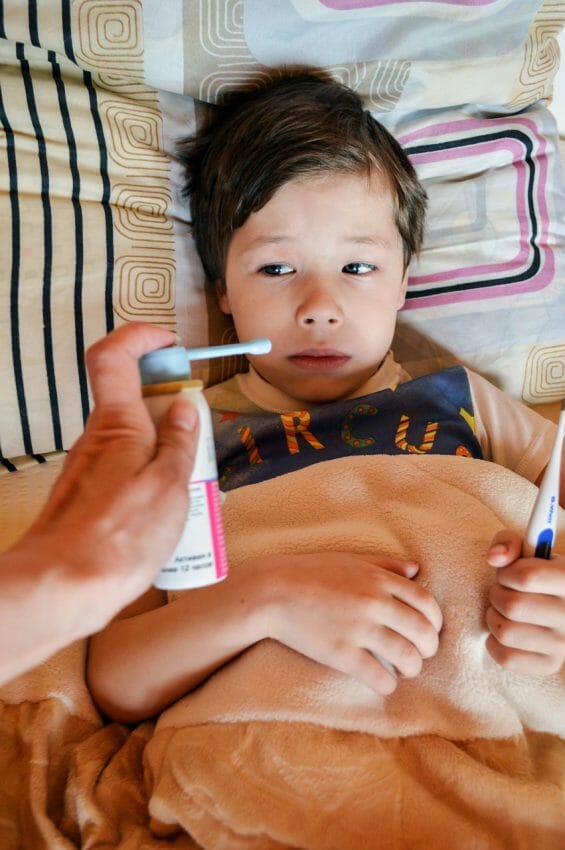As a parent, one of your top priorities is keeping your kids healthy. You want to shield them from germs and keep them away from anyone who might be sick. But once the chilly weather hits and kids are heading back to school, things get tricky.
Cold and flu season is almost unavoidable when you combine cramped classrooms, shared textbooks, and coughing peers. It’s nearly impossible to prevent your child from catching a cold or the flu, which is why it’s important to keep cough medicine for kids on hand. Let’s take a look at four more tips to keep your kids healthy during cold and flu season.
1. Stay Up to Date on Vaccines
Vaccines are extremely effective in preventing certain types of infections. Vaccines are made from dead or weakened viruses or bacteria that cause certain illnesses. If a person gets vaccinated and then comes in contact with the actual virus, his or her body will recognize the invading organism and create antibodies to fight it off.
You can help your child avoid getting sick by keeping up with their vaccines. Visit your doctor to see if your child is up-to-date on their vaccinations. If your child is too young to receive certain vaccines, you can still protect them by ensuring they don’t come in contact with those germs.
2. Keep an Eye on Possible Symptoms
A sign that your child may be coming down with a cold or the flu is a sudden change in behavior. If your child is generally happy and outgoing but then suddenly becomes irritable and quiet, it’s something to watch out for. This could be a sign they are coming down with something.
Flu-like symptoms can include a fever accompanied by a runny nose, congestion, muscle aches, and headaches. There are also a number of cold symptoms such as runny nose, cough, sore throat, and congestion. Your child may have one or a combination of these symptoms.
If your child has any of these symptoms, take note of how long they last. Anything over two days is cause for concern. Flu and cold symptoms should generally only last a few days. If they last longer than that, you should talk to your doctor about the possibility of your child having an infection. A trip to an urgent care clinic like Jacksboro Urgent Care may be your best bet to seek immediate medical attention if your child’s physician is unavailable
3. Build Up Your Child’s Immune System
It’s not possible for parents to completely avoid their child from coming into contact with germs and getting sick. However, there are ways to reduce and prevent your child from getting sick as often.
Some ways to build up your child’s immune system include:
- Feeding your child a healthy diet
A healthy diet goes beyond feeding your child vegetables and fruits. What your child eats can have an effect on their immune system. Too many sugary and processed foods can cause your child’s immune system to lose effectiveness. Try to feed your child a diet rich in whole grains, fruits and vegetables, and protein.
- Getting your child plenty of sleep
Your child’s immune system grows and develops while they’re sleeping. A healthy sleeping schedule will keep your child’s immune system strong.
- Creating a sanitary environment for your child at home
Viruses and bacteria thrive in moist environments. You can help prevent the spread of germs in your home by creating a more sanitary environment. Some ways you can do this include wiping down surfaces, cleaning toys, and using hand sanitizer.
4. Create a Sanitary Environment for Your Child at School
In addition to creating a sanitary environment at home, it’s important to create a sanitary environment at your child’s school as well. There are a few ways you can do this:
- Talk to your child’s teacher
A great way to start is by talking to your child’s teacher. Let them know that you’re concerned about the spread of germs and ask what can be done to prevent it.
- Wipe down surfaces
Whenever you’re at your child’s school, take a moment to wipe down surfaces such as doorknobs, tables, and desks.
- Regularly disinfect toys
Disinfect toys that are commonly used in classrooms, such as stuffed animals and building blocks.
Sick and Tired
Cold and flu season is an unavoidable time of year when viruses are rampant and people are sick. The best you can do is try to stay vigilant and take precautions to avoid being affected by these diseases. You don’t want your child to fall behind in school or get other kids sick as well.
The most important thing you can do as a parent is stay informed and up to date on the latest flu and cold prevention strategies. As the old saying goes, an ounce of prevention is worth a pound of cure. By keeping yourself and your children informed, you can help avoid getting sick and keep everyone healthy and happy this winter.



